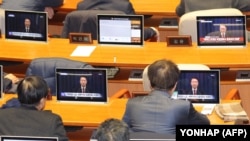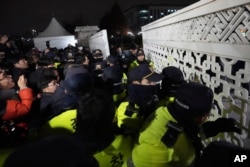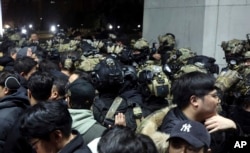South Korean opposition lawmakers submitted a motion Wednesday to impeach President Yoon Suk Yeol, hours after the president briefly imposed martial law in an unanticipated move that rattled the nation.
The Democratic Party said in a statement that Yoon’s move was a “grave violation” of the country’s constitution.
“It was a grave act of rebellion and provides perfect grounds for his impeachment,” the statement said.
The Democratic Party had called on Yoon to resign, saying that if he did not, then the party would “immediately initiate impeachment proceedings in line with the will of the people.”
Yoon’s office said Wednesday that senior presidential advisers and secretaries offered to resign.
In a late Tuesday address, Yoon justified his decree by citing the need to eradicate "anti-state forces" and "protect the constitutional democratic order."
Less than six hours later, after the country's parliament overturned the martial law decree, Yoon backed down saying the decree would be lifted and martial law forces withdrawn.
The developments stunned political observers in South Korea, a U.S. ally accustomed to political gridlock but unaccustomed to such drastic measures. It marked the first declaration of martial law since South Korea transitioned to democracy in the 1980s.
The decree — which sought to ban political activities and place media under military control — triggered a frantic response at South Korea's National Assembly, the unicameral legislature controlled by Yoon's opponents.
Shortly after his address, South Korean military forces descended on the legislative compound, with some reportedly arriving by helicopter, according to a VOA reporter on the scene. Security forces attempted to bar entry to lawmakers and others.
Despite minor scuffles at the main gate, opposition lawmakers eventually forced their way inside, with some livestreaming on social media as they climbed over gates and through windows to reach the legislative chambers.
In an emergency session less than three hours after Yoon's declaration, 190 lawmakers in the 300-seat body voted to lift the decree. Under South Korea's constitution, the president is required to comply when a majority of lawmakers vote to overturn martial law.
Though the military eventually withdrew from the National Assembly compound, protesters remained nearby into the early morning hours, with many calling for Yoon's arrest.
"I was about to sleep, but after watching the news, I got so angry and I couldn't stay home," said Jo Geun-wook, a 34-year-old Seoul resident. "I really hope impeachment takes place."
There have been no reports of injuries, but many expressed concern about how events would play out in the coming days.
On Tuesday night, 18 members of Yoon's People Power Party (PPP) voted with the opposition to overturn the martial law decree.
Han Dong-hoon, the head of the PPP, who has grown increasingly critical of Yoon, said in a social media post that the president's "martial law declaration is wrong" and that he would "work with the citizens to stop it."
South Korea is one of the United States' most important allies, and hosts about 28,000 U.S. troops.
On Tuesday, U.S. Deputy Secretary of State Kurt Campbell said he was watching the developments with "grave concern" and said he was working to engage his South Korean counterparts.
A White House spokesperson said the United States had not been notified of Yoon's move in advance.
Deputy State Department spokesperson Vedant Patel said he hopes "any dispute will be resolved peacefully and in accordance with the rule of law." The vote at the National Assembly, he said, "will be consistent with that approach."
Some information for this report was provided by from The Associated Press, Agence France-Presse and Reuters









